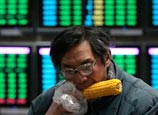
The road ahead
Sinograin may also be considering a change in strategy, with the latest announcement by its oils and fats subsidiary revealing a hefty advertising investment plan.
Sinograin Oils and Fats Industrial Co plans to put 1 billion yuan toward advertising to promote awareness of the company's brand, Nandu Daily reported on June 5, without specifying the time frame.
The unnamed official said that the plan was formed mainly by the oils and fats division, but he said it is quite normal for Sinograin to invest in advertising, which is part of the company's development strategy.
If Sinograin shifts toward becoming a grain merchant, it would definitely deal a blow to other grain enterprises considering its market clout, but in the long run the government will release favorable policies to support smaller enterprises in the field, said Ma from Beijing Orient.
But some industry insiders said it is unlikely the government will free up the grain market for full and open competition, despite worries about Sinograin's management chaos.
"It is not Sinograin but the Chinese government that controls the grain market, as ensuring grain security and reserves rules out the possibility of a full market-oriented mechanism," Jiao Shanwei, editor-in-chief of Zhengzhou-based grain portal cngrain.com, told the Global Times Thursday.
Sinograin is more of an agency implementing the central government's rules and regulations rather than a business body, Jiao noted, saying the overlapping roles of Sinograin will not have any big impact on its outlook.
As for average staffers at Sinograin, the future of the company's strategy is not their biggest concern.
Contrary to the public perception of what might be an easy life within the huge depot system, an employee surnamed Guo with the local State grain reserve warehouse in Hengtai, a county in East China's Shandong Province, told the Global Times Thursday that they have to meet certain sales targets every fourth months to ensure the freshness of grain kept in the warehouse.
"We'll get punished if the target cannot be hit," Guo said. He did not give the exact target figures.
Meanwhile, procurement prices for grain have been on the rise recently, and it has become more difficult to procure grain from farmers because of the existence of other buyers who offer higher prices to the farmers, said Guo.

















 Wait and See!
Wait and See!
I can catch you, rats


![]()
